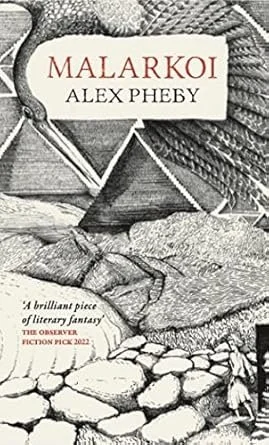Book Review: Malarkoi by Alex Pheby
Malarkoi is a strange and understandably divisive follow up to the cult hit Mordew. While the latter used its strangeness and overwhelming complexity to tell what was essentially a very tightly knit character-driven story with clear emotional resonance, the former creates distance to focus on meta-narrative threads and stage setting for what is now a fully labyrinthine plot.
It is rare for a series to completely upend its narrative structure between books, especially when that entails such a stark shift in the style and ‘feel’ of the story being told, and yet that is exactly what Malarkoi puts forward to the reader. Rather than having a standard beat to beat flow, chapters are instead broken up and capsulised into their own arcs that have a distinct beginning, middle and end. In doing this, Malarkoi aims to tackle steep world building concepts and philosophy in a piece-by-piece way that Mordew’s narrative simply had insufficient room for.
The consequence of this for the reader is being dropped into a state of initial confusion that slowly builds up towards understanding and revelation, tricking you into feeling confident, before suddenly restarting the process with a new chapter and concept. That is the essence of why readers who enjoyed Mordew might not then view Malarkoi in the same positive light, and it is certainly a fair criticism to say that being constantly spun around and left without anything to
hold on to makes it harder to engage. But as someone who favours experimental experiences and bold creativity in spite of its abrasiveness, I actually quite appreciated it.
To be clear, it’s not just ‘being different’ that makes Malarkoi a memorable divergence, but the fact that it being different is such a carefully considered narrative approach. In turning towards meta narrative, each chapter is allowed to exist within its own space, and prove its capacity for storytelling in the same turn of the page that is used to teach the reader. This is how I can - as an example - immerse myself in a society of hybrid snake people, then move on to the escapades of a voiceless dog and feel, firstly, no disconnect, and secondly, that I actually learned something.
While debate can be had about how often this hits or misses, the mere fact that Alex Pheby sought to imagine a different way of exploring the Cities of the Weft, and followed through on the endeavour, makes his work worthy of admiration. When I spoke about Mordew I said that
the greatest boon it put forward was its author, and Malarkoi proves that fact. This book is not just a result of a bright imagination, but ambition and personality. In sum and truth, I didn’t enjoy the second book as much as the first, and that is a point I would press home for
readers just looking for a straightforward recommendation, but I respect what it does and how it does it. Nobody is writing quite like Alex Pheby at the moment.


